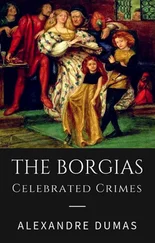And in his present situation, Cesare accepted the fact that he would have to undertake a realignment in his relations with foreign powers now that Spain was emerging as the stronger power in her struggle with France over Naples, notably since April 28, when the commander of the Spanish army, Gonsalvo di Córdoba, won a decisive victory over the French at Cerignola, exposing the weakness of the French hold over Naples. Cesare had his eyes on Tuscany, and it was believed that he had it in mind to form an alliance with the Spaniards to gain his end.
Cesare could do nothing, however, until he had raised more money to replenish his coffers, which had been so drastically depleted by his campaign of the previous year, by his attacks on the Orsini, and by his wild extravagance. Once again he turned to his father.
When the rich Venetian Cardinal Giovanni Michiel died in mysterious circumstances on April 10, 1503, after days of vomiting and diarrhoea, it was widely conjectured that the pope himself had been instrumental in having him poisoned. Certainly, so the Venetian ambassador Antonio Giustinian was told: ‘As soon as the Pope heard of his death he sent a man to his house and, before dawn, it was completely plundered,’ adding that ‘the death of the Cardinal has brought him over 150,000 ducats.’
Further amounts, so Giustinian claimed, were raised by the creation of cardinals. In May 1503 the nomination was agreed in a secret consistory of nine new cardinals; the three Italians were all Borgia men, one was German, a favour to the emperor, and the other five were Spaniards, all well disposed toward the Spanish pope and a reflection of Alexander VI’s change of policy; none, significantly, were French. ‘Today there was a consistory,’ Giustinian reported to the Venetian government, ‘and nine new cardinals were nominated, mostly men of dubious reputation and all have paid handsomely for their elevation, some 20,000 ducats and more, so that from 120,000 to 130,000 ducats have been collected; it is notorious that His Holiness is showing the world that the amount of a pope’s income is whatever he chooses it to be.’
A man who had worked for them in the past and had hoped to be rewarded with a red hat, Francesco Troche, did not trouble to conceal his disappointment and spoke slightingly of Cesare. ‘His Holiness the Pope told him that he was a madman to speak like that and if the Duke came to hear of it he would be killed,’ reported one ambassador to his master, ‘and it was because of the words of His Beatitude that, terrified, Troche took flight.’ He fled first to Genoa and then, by way of Sardinia, ended up in Corsica; but there he was caught and brought back to Rome, where he was strangled by Cesare’s sinister lieutenant, Miguel da Corella. On the same day, another man who had fallen foul of Cesare, Jacopo di Santacroce, a Roman nobleman and former Borgia supporter, was hanged and his body displayed on the Ponte Sant’Angelo as a warning to all enemies of the Borgias.
Cesare was now at the height of his power. Having raised enough money by all the means at his disposal, and ridding himself of several enemies, he now enrolled an army of some twelve hundred light cavalry and over four thousand infantry, all wearing his red-and-yellow livery, with the word CESAR in large letters embroidered on the chests and backs of their uniforms. ‘All the best soldiers were with him,’ the chronicler Matarazzo wrote. ‘And he had so much accumulated treasure and possessions that it seemed there was not as much elsewhere in all Italy. Nor were there as many well-disciplined soldiers so well supplied with arms and horses.’
Cesare was ready for his next campaign. At the beginning of July, the pope confirmed him as ruler of Città di Castello and ordered the city of Perugia to accept his lordship; he expected soon to add the cities of Pisa, Lucca, and Siena to his dominion. Poised for his Tuscan campaign, Cesare’s well-supplied and well-trained army began to march north up the Via Flaminia toward Perugia and the borders of Tuscany. Cesare himself remained in Rome, waiting for the right moment to start. With the Spanish army facing unexpected opposition in its conquest of the kingdom of Naples, its advance slowed; the French troops in northern Italy, meanwhile, had begun their long march south to relieve their beleaguered comrades. Cesare had to gamble on the Spanish winning through and fixed the date of his departure for August 9.
— CHAPTER 23 — The Death of the Pope
‘THIS MONTH IS FATAL FOR STOUT MEN’
THE WEATHER IN ROME that summer of 1503 was unusually hot and humid. Alexander VI had fallen ill in July, and when the Venetian ambassador had visited him in the papal apartments in the Vatican, he had found the pope ‘reclining on a sofa, fully clothed.’ Giustinian reported that Alexander VI ‘received me with good humour, saying that for three days he had been inconvenienced by a slight dysentery but that he hoped it would be nothing serious.’
‘There are many ill with fever here,’ a Florentine working in Rome wrote that July; ‘and people are dying in great numbers.’ One of the dead was the former Florentine ambassador, whose successor was now gravely ill. Despite his seventy-three years, the pope recovered his health quickly enough but not his normally ebullient demeanour. Alexander VI grew unusually depressed as the daily death toll grew of men, women, and children who had succumbed to the fever — typhoid, typhus, or perhaps malaria — that raged in the city. He admitted as much to Giustinian, to whom he confessed that he was preoccupied with these reports: ‘All these deaths make us fearful and persuade us to take more care of our health.’ On August 1 his nephew Cardinal Juan Borgia died; and as the pope watched the funeral procession pass beneath his window, he remarked, with uncharacteristic mournfulness, ‘This month is fatal for stout men.’ The sultry months of July and August had indeed proved fatal for his five predecessors, Innocent VIII, Sixtus IV, Paul II, Pius II, and the pope’s own uncle Calixtus III.
On August 5, just four days before Cesare was due to leave Rome, father and son accepted an invitation to dinner at the villa of Cardinal Adriano Castellesi in the countryside some miles outside of Rome. On this occasion it was Cesare’s health that caused the greater anxiety, since he was not only suffering from pain in his stomach, but also, according to Burchard, he was ‘much irritated by the skin on his face in the lower part, which falls apart like rotten leaves and results in a pus that he is much concerned to hide with his mask.’
On their arrival at Castellesi’s villa, father and son were both extremely thirsty and asked for cups of wine, which they drank ‘most gratefully.’ It was a sultry evening, and the guests dined alfresco, thankful for the shade cast by the trees in the garden. The next day their host felt ill and went to bed; a week later the pope also took to his bed; Cesare then fell ill; so did several of the cardinal’s other guests, as well as some of his servants. Poison was naturally suspected. Giustinian was among those who believed that a servant had been responsible; others suggested that Cesare was the poisoner. Yet others said that the pope himself was responsible, that he had intended poisoning his former secretary for some reason but had inadvertently drunk the poisoned wine himself. It was not the wine that had been tampered with, others maintained, but poisoned sweetmeats that had been passed around among the guests after the meal.
But the pope himself declared that the putrid air in Rome during this intolerable heat wave was probably responsible. Beltrando Costabili, the Ferrarese ambassador in Rome, reported that it was not surprising that the pope and his son had both fallen ill, ‘since all the palace officials are in the same condition because of the unwholesome air here.’
Читать дальше











